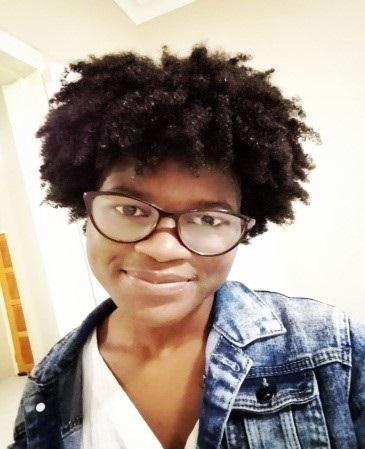The magulification of Afrikan hair
History has it that many Afrikan cultures developed hairstyles that defined status regardless of age, ethnicity and other parameters.
Back in the day, wearing kinky hair in its natural state represented embracing one’s natural self or pride of being a black Afrikan.
For some, it was simply a matter of style or preference.
There are different Afrikan hair types with observable differences in the structure, density and growth rate of hair. All human hair has the same basic chemical composition in terms of keratin protein content. Keratin determines the growth rate at times.
The following paragraphs will strengthen the magufulification of the hair of Afrikan women and the necessity to respect and defend their God-given crown.
True to self
There is an Afrikan adage: ‘Black is beauty’. It is so admirable to be a black woman with natural hair who is brave enough to be authentic in a competitive world that rewards mediocrity, expectation and approximation in our contemporary time.
To represent who you are rightfully, beautifully, bravely and smartly is being true to one’s identity.
Afrikan women (global south) ought to realise with that European features (global west) are not the epitome of beauty and they must appreciate their own identity.
The omniscient nature created the Afrikan woman’s hair and saw what was objectively aesthetic in itself and independent from our mere suggestions and opinions.
We are created equal with certain inalienable rights such as love, liberty and the pursuit of happiness (summum bonum).
The omniscient nature has created black afro-textured hair that is phenomenally black and has attributed beautiful kinky crowns to her perfect Afrikan essence and an existence distinguishable from that of the global west.
He saw what was beautiful. Each black woman is uniquely and wonderfully made.
Unique
The conquered mind is a dangerous mind.
Inferiority complex is not in our DNA. Beauty of a woman is found on her head, but this does not mean we should do it the European way because we have so many ways we can style our own Afrikan kinky pride and thus defend our Afrikan identity.
Being natural is not a statement; it is the closest one gets to being true to one’s self.
Everyone is unique and beautiful and nobody else can be the exact clone of the version you are.
A black woman with beautiful black kinky hair should be proud of being that colour because then the blackness does not inhibit her from being beautiful and intelligent.
The logic dictates that she should lovingly groom her hair and choose the thoughts that support its growth and strength.
She should love and appreciate her beautiful naturals because there is nothing ugly or wrong with having a naturally textured hairline.
A black woman without her kinks can be equated to a leopard without spots. Although some say natural hair is not for everyone, it is an inalienable part of one’s ontological existence.
Embrace
May the Afrikan hair colour and texture match that of your skin colour, so much so that the entire universe stares at you like Miss Namibia, Chelsi Shikongo.
Your hair does not need to be manipulated. Society’s view of beauty is broken. Embrace that dense and kinky crown of hair, because it is your identity, a gift from nature.
Afrikan women should not only define their identity, they should defend their Afrikan identity, their pride and ancient natural hair.
Afrikan women are the irreplaceable queens of mother Afrika. They should prove this through crowning themselves with their very own beautiful curls.
There is a necessity to magulify and embrace that afro, that indelible identity, wearing it beautifully to memorable occasions such as birthdays, graduations, weddings and all other sort of historic and remarkable events in the African cultural civilisations.
**Coined by PLO Lumumba after late former Tanzanian president John Magufuli, magulification means “to render or declare an action faster or cheaper; to deprive (public officials) of their capacity to enjoy life at taxpayers’ expense; to terrorise lazy and corrupt individuals in society”.
*Ndapanda Ndeshiteelela Mundjulu is a metallurgy graduate and Jeronimo Nghilunanye Kateya is a pluridisciplinarian.
Back in the day, wearing kinky hair in its natural state represented embracing one’s natural self or pride of being a black Afrikan.
For some, it was simply a matter of style or preference.
There are different Afrikan hair types with observable differences in the structure, density and growth rate of hair. All human hair has the same basic chemical composition in terms of keratin protein content. Keratin determines the growth rate at times.
The following paragraphs will strengthen the magufulification of the hair of Afrikan women and the necessity to respect and defend their God-given crown.
True to self
There is an Afrikan adage: ‘Black is beauty’. It is so admirable to be a black woman with natural hair who is brave enough to be authentic in a competitive world that rewards mediocrity, expectation and approximation in our contemporary time.
To represent who you are rightfully, beautifully, bravely and smartly is being true to one’s identity.
Afrikan women (global south) ought to realise with that European features (global west) are not the epitome of beauty and they must appreciate their own identity.
The omniscient nature created the Afrikan woman’s hair and saw what was objectively aesthetic in itself and independent from our mere suggestions and opinions.
We are created equal with certain inalienable rights such as love, liberty and the pursuit of happiness (summum bonum).
The omniscient nature has created black afro-textured hair that is phenomenally black and has attributed beautiful kinky crowns to her perfect Afrikan essence and an existence distinguishable from that of the global west.
He saw what was beautiful. Each black woman is uniquely and wonderfully made.
Unique
The conquered mind is a dangerous mind.
Inferiority complex is not in our DNA. Beauty of a woman is found on her head, but this does not mean we should do it the European way because we have so many ways we can style our own Afrikan kinky pride and thus defend our Afrikan identity.
Being natural is not a statement; it is the closest one gets to being true to one’s self.
Everyone is unique and beautiful and nobody else can be the exact clone of the version you are.
A black woman with beautiful black kinky hair should be proud of being that colour because then the blackness does not inhibit her from being beautiful and intelligent.
The logic dictates that she should lovingly groom her hair and choose the thoughts that support its growth and strength.
She should love and appreciate her beautiful naturals because there is nothing ugly or wrong with having a naturally textured hairline.
A black woman without her kinks can be equated to a leopard without spots. Although some say natural hair is not for everyone, it is an inalienable part of one’s ontological existence.
Embrace
May the Afrikan hair colour and texture match that of your skin colour, so much so that the entire universe stares at you like Miss Namibia, Chelsi Shikongo.
Your hair does not need to be manipulated. Society’s view of beauty is broken. Embrace that dense and kinky crown of hair, because it is your identity, a gift from nature.
Afrikan women should not only define their identity, they should defend their Afrikan identity, their pride and ancient natural hair.
Afrikan women are the irreplaceable queens of mother Afrika. They should prove this through crowning themselves with their very own beautiful curls.
There is a necessity to magulify and embrace that afro, that indelible identity, wearing it beautifully to memorable occasions such as birthdays, graduations, weddings and all other sort of historic and remarkable events in the African cultural civilisations.
**Coined by PLO Lumumba after late former Tanzanian president John Magufuli, magulification means “to render or declare an action faster or cheaper; to deprive (public officials) of their capacity to enjoy life at taxpayers’ expense; to terrorise lazy and corrupt individuals in society”.
*Ndapanda Ndeshiteelela Mundjulu is a metallurgy graduate and Jeronimo Nghilunanye Kateya is a pluridisciplinarian.





Comments
Namibian Sun
No comments have been left on this article